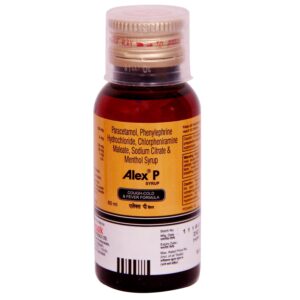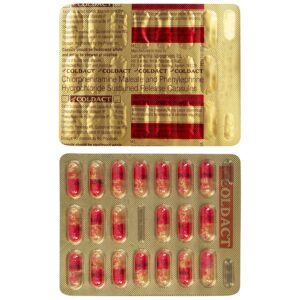CHLORPHENIRAMINE + PHENYLPROPANOLAMINE
Chlorpheniramine: Chlorpheniramine is an antihistamine drug that is commonly used to relieve symptoms of allergies, such as hay fever, sneezing, itching, and runny nose. It is also used to treat symptoms of the common cold and other respiratory conditions.
The drug works by blocking the action of histamine, a chemical in the body that is responsible for causing allergic symptoms. By inhibiting the effects of histamine, Chlorpheniramine helps reduce the symptoms of allergies and provides relief to the patient.
Chlorpheniramine is available in various forms including tablets, capsules, and liquid solution. The recommended dose of Chlorpheniramine may vary depending on the specific product and the age of the patient. It is important to follow the instructions provided by the healthcare provider or the instructions on the packaging.
As with any medication, Chlorpheniramine may cause side effects. Common side effects include drowsiness, dizziness, dry mouth, blurred vision, constipation, and difficulty urinating. These side effects are generally mild and go away on their own. However, if they persist or become bothersome, it is advisable to consult a healthcare professional.
In some cases, Chlorpheniramine may cause more severe side effects such as rapid or irregular heartbeat, hallucinations, seizures, or difficulty breathing. If any of these side effects occur, it is important to seek immediate medical attention.
Chlorpheniramine may interact with other medications, so it is essential to inform the healthcare provider about any other drugs you are taking. It is also important to disclose any medical conditions or allergies to ensure the safe use of Chlorpheniramine.
Overall, Chlorpheniramine is an antihistamine that is commonly used to relieve allergy symptoms. It works by blocking the effects of histamine and is available in various forms and strengths. However, it may cause side effects, and it is important to follow the recommended dose and consult a healthcare provider if any concerns arise.
Phenylpropanolamine: Phenylpropanolamine (PPA) is a sympathomimetic drug that was commonly used as a decongestant and appetite suppressant. However, it has been withdrawn from many markets due to concerns about its safety and potential for stroke.
Mechanism of Action:
PPA acts by stimulating the alpha-adrenergic receptors, which causes vasoconstriction and reduces nasal congestion. It also has mild stimulating effects on the central nervous system, which may lead to appetite suppression.
Use:
PPA was primarily used in over-the-counter cough and cold medications, as well as weight loss products. It was also occasionally prescribed by doctors for similar purposes.
Dose:
The recommended dose of PPA varied depending on the product and indication. Generally, the standard dose for adults was around 25-50 mg, taken 3 times per day. However, it is important to note that this drug is no longer widely available or recommended for use.
Side Effects:
PPA has been associated with several serious side effects, which led to its discontinuation in many countries. The most significant concern was an increased risk of hemorrhagic stroke, especially in women. Other common side effects include increased blood pressure, rapid heart rate, nervousness, dizziness, headache, and insomnia.
Due to the potential risks associated with PPA, it is crucial to consult with a healthcare professional before considering its use. Moreover, it is essential to note that this information only applies to historical use, as most countries have banned the use of PPA in medications.


